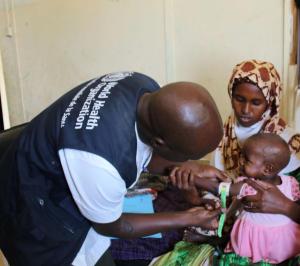Ethiopia sets new standards for the management of acute malnutrition
Addis Ababa, 25 June 2019 | Every month over 25,000 children with severe acute malnutrition are admitted to hospitals across Ethiopia. If not identified early and treated properly, these children could die. Survivors are more likely to perform poorly in school and, once grown up, girls are more likely to suffer from complications during childbirth.
In an effort to improve malnutrition detection and care, a government-led technical working group supported by the World Health Organization (WHO) recently revised and updated the National Guideline for the Management of Acute Malnutrition.
The new guideline was launched on June 25th, 2019 by Dr Lia Kebede, State Minister of the Federal Ministry of Health, who noted that “nutrition is now getting the attention it deserves. We launched the first ever Food and Nutrition Policy in 2018, and today we are gathered here for another very important milestone, to launch the revised guideline for management of acute malnutrition; the guideline which is expected to benefit children and mothers greatly when properly implemented”.
The guideline replaces the 2007 protocol for management of acute malnutrition, and is based on the 2013 WHO global recommendation for the management of severe acute malnutrition.
The launching ceremony in Addis Ababa was attended by government officials from Federal and Regional Health Bureaus, NGOs, the donor community and representatives from United Nations agencies.
The new guideline provides structured guidance for frontline health care professionals on how to care for those affected by acute malnutrition. It includes evidence-based revisions for using routine drugs for malnourished children, sensitive admission and discharge criteria for nutrition programs, and incorporation of the management of moderate acute malnutrition into health facility services. The whole spectrum of care for malnourished children is covered, including in-patient therapeutic management in stabilization centers, out-patient therapeutic management, supplementary feeding programs, and community-level involvement and engagement in the prevention and identification of malnutrition.
“With the revised guideline, we will be able to detect children with acute malnutrition earlier and provide them with an improved quality of care,” said Dr Aggrey Bategereza, the WHO Representative in Ethiopia a.i. He added that achieving the desired goals requires a concerted effort from all partners, and emphasized that WHO will support the roll-out and implementation of the new guideline in collaboration with other stakeholders.
As a member of the technical working group, WHO supported the government to adapt and understand the WHO global severe acute malnutrition recommendations. It also provided resource materials such as job aids on the in-patient management of SAM which were incorporated into the guideline. WHO as technical lead is also playing its role in the development of training materials for the guideline.
Following the launch, regional focal persons received a technical briefing and developed action plan to ensure that proper interventions for acute malnutrition will be given due place in the work plans of their respective areas.
The high levels of malnutrition in Ethiopia results from an accumulation of different causes, ranging from climate-change induced food shortages and population movements, to an ever-increasing population needing to survive on limited resources. These factors are not easily controlled, which is why finding malnourished children early and providing them effective treatment is a cornerstone in promoting health and supporting successful development in Ethiopia.
Technical Officer, Nutrition
World Health Emergencies, Ethiopia
Email: lanyerob [at] who.int (lanyerob[at]who[dot]int)
Technical Officer, Nutrition
WHO, Ethiopia
Email: beyeneg [at] who.int (beyeneg[at]who[dot]int)
Communications officer
World Health Emergencies, Ethiopia
email: negasht [at] who.int (negasht[at]who[dot]int)



